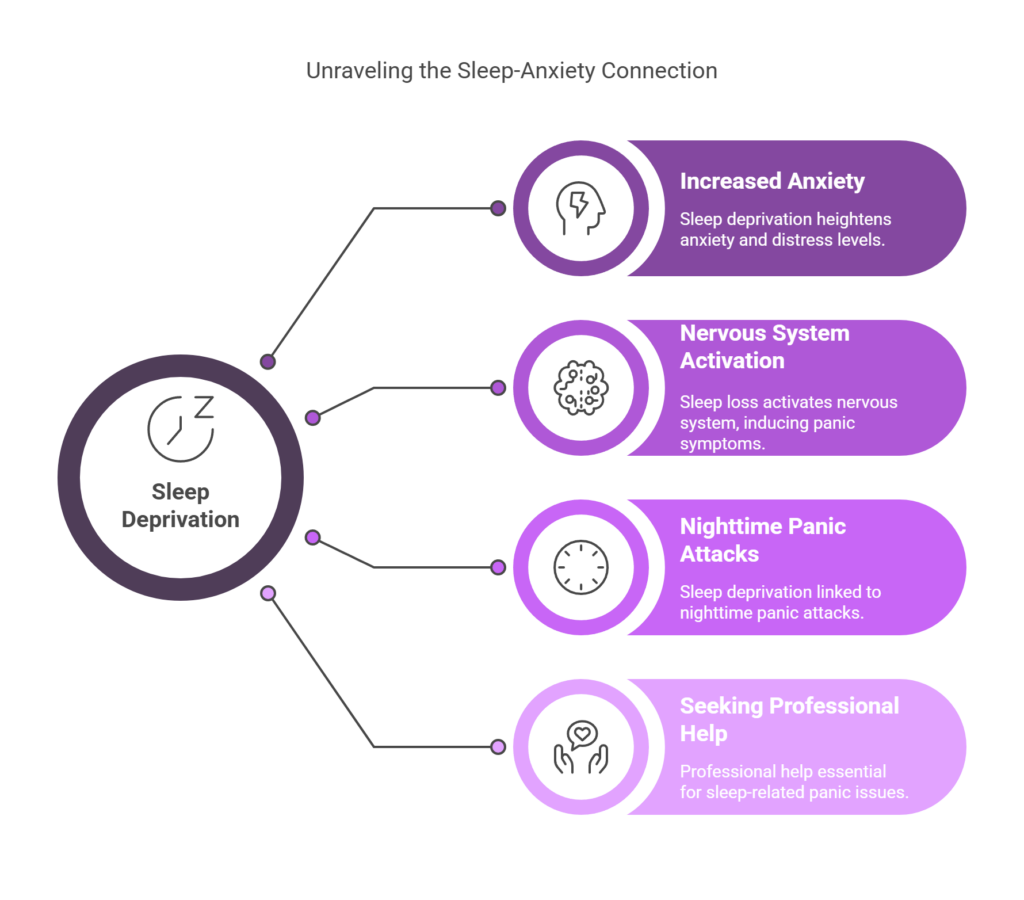If you’re struggling with anxiety, panic attacks, or addiction, you may have noticed that they get worse after a bad night’s sleep.
But can sleep deprivation cause panic attacks?
The answer is yes, and the science behind it is clear.
When was the last time you had a truly restful night?
If you’re struggling with anxiety, addiction, or other mental health issues, sleep might feel impossible to achieve. The tossing, the turning, the racing thoughts; then suddenly, a panic attack strikes. If this cycle feels familiar, you’re not alone.
Many people don’t realize that lack of sleep can fuel mental health struggles, addiction, and panic attacks. Research confirms the question, that, can sleep deprivation cause panic attacks? The answer is yes; and it can also make depression, anxiety, and substance use worse.
At Relevance Recovery, we specialize in helping individuals overcome anxiety, panic attacks, and addiction by treating both the symptoms and their root causes. We know how deeply sleep deprivation and mental health are connected, and we offer targeted treatment programs to help you find relief. If sleepless nights are taking over your life, we’re here to guide you toward healing.
The Link Between Sleep and Mental Health
Lack of sleep doesn’t just make you tired; it can intensify mental health issues and addiction struggles. Research has shown that sleep deprivation cause panic attacks. Yes, and it can also worsen anxiety, depression, and PTSD.

If you’re experiencing any of these struggles, Relevance Recovery provides specialized programs that address sleep issues alongside mental health and addiction treatment.
Yes, and here’s why.
When you don’t sleep enough, your body goes into survival mode. This means your stress response is heightened, making you more prone to panic attacks and emotional instability.
If you’ve ever asked, “can sleep deprivation cause panic attacks?”, the answer is clear: Yes, and it can also worsen other mental health conditions.
If can sleep deprivation causes panic attacks, what’s the solution? The key is to address both sleep issues and mental health together. At Relevance Recovery, we offer comprehensive treatment to help you regain control.
We use Cognitive Behavioral Therapy (CBT) to retrain your brain and stop the cycle of anxiety and panic attacks.
We create customized sleep plans to help regulate your sleep cycle and prevent panic-inducing insomnia.
We incorporate breathing techniques, mindfulness, and relaxation therapies to help calm your nervous system before bed.
If your panic attacks and sleep struggles require medication, we provide safe, supervised treatment plans to restore balance.
Through targeted therapy, sleep interventions, and holistic healing, we help you achieve better sleep and fewer panic attacks.
If you’re wondering, “can sleep deprivation cause panic attacks?”, the good news is that you can take steps to reduce this risk.
At Relevance Recovery, we specialize in helping individuals break free from the cycle of sleep deprivation and anxiety. If self-help strategies aren’t working, our expert team is here to provide the support you need.
If panic attacks, insomnia, or mental health struggles are interfering with your daily life, professional support can help.
At Relevance Recovery, we specialize in treating panic attacks, sleep disorders, and addiction in a way that supports long-term healing.
If you’ve been wondering, “Can sleep deprivation cause panic attacks?” the answer is clear: Yes, and it can also make mental health struggles worse.
But there’s hope. You don’t have to stay stuck in this cycle. At Relevance Recovery, we provide personalized treatment plans designed to help you sleep better, manage anxiety, and regain control over your life.
Don’t wait for things to get worse. If sleepless nights and panic attacks are affecting your life, contact Relevance Recovery today for Panic Disorder Treatment and start your journey toward healing.
FAQs
Yes, sleep deprivation can trigger panic attacks by increasing stress hormones and overactivating the brain’s fear response. Lack of sleep makes it harder to manage anxiety, leading to more frequent and intense panic episodes.
A nocturnal panic attack is a sudden episode of intense fear or anxiety that occurs while sleeping. It can wake a person up with symptoms like a racing heart, shortness of breath, and dizziness, often without an obvious trigger.
Yes, with the right treatment, sleep anxiety can improve. Cognitive Behavioral Therapy (CBT), relaxation techniques, and sleep hygiene practices can help reduce nighttime anxiety and restore a healthy sleep pattern over time.
Panic attacks can be triggered by stress, lack of sleep, caffeine, trauma, or underlying mental health conditions. Physical sensations like rapid heartbeat or dizziness can also trigger panic, making the body think it’s in danger even when it’s not.